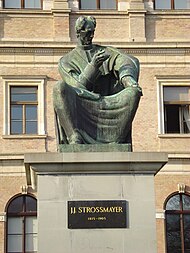Josip Juraj Strossmayer
Josip Juraj Strossmayer | |
|---|---|
Illyrian Movement | |
| Signature | |
Josip Juraj Strossmayer, also Štrosmajer (pronounced
Early life and Church career

Strossmayer was born in
In 1838, he worked as a
First Vatican Council
At the First Vatican Council (1869–1870), Strossmayer was one of the most notable opponents of papal infallibility, and distinguished himself as a speaker. Pope Pius IX praised Strossmayer's "remarkably good Latin." A speech in which Strossmayer defended Protestantism made a great sensation.[2] Another speech, allegedly delivered on 2 June 1870 was attributed to him.[3] It was a forged by a former Augustinian, Mexican named José Agustín de Escudero. It was full of heresies and denied not only papal infallibility, but also the papal primacy.[2]
On 26 December 1872, Strossmayer published the decrees of the council in his official paper.[2] He later proclaimed his submission to the pope, as in his pastoral letter of 28 February 1881 on Sts. Cyril and Methodius, expressing his devotion to the papal see at times in extravagant language.[4]
Political work
In politics, Strossmayer was an active supporter of the People's Party, he advocated and Pan-Slavism[2] and Yugoslavism.[5] He started his political career in 1860, when he became member of the Imperial Council. There, he spoke against centralism and absolutism, bust also opposed Hungarian demands for greater independence. He supported federalization of the Austrian Empire. After Strossmayer's criticism, Imperial government made concessions regarding the official use of the Croatian language in Croatia and Slavonia.[6]
In 1861, Strossmayer became member of the
In 1860, Strossmayer advocated Yugoslavism within federal Austria-Hungary. Frenchman Charles Loiseau wrote that Serbian Prince Mihailo prepared a secret plan on unification of Serbs and Croats in 1866. According to Loiseau, this plain was prepared by Jovan Ristić, Prince Nicholas I of Montenegro and Strossmayer.[7] Strossmayer published denial and called this a lie.[7]
Cultural work
Strossmayer used the large revenues of his diocese to found educational and art institutions. Under his direction,
Strossmayer was instrumental in the founding of the
Strossmayer aided the creation of the printing house in

Personal life

Since the early days of his episcopate, he was a close friend of Franjo Rački, the most renowned Croatian historian of his time. When the Academy was founded in 1867, Strossmayer was named chief sponsor, and Rački its President. In 1894, when Rački died, Strossmayer wrote: "I lost my dearest friend... I lost a part of myself... the good half of everything I have created was his thought, his credit and his glory". Their friendship was well documented in a series of four books containing their letters, compiled by historian Ferdo Šišić.[11]
Legacy

Bishop Nikolaj Velimirović dedicated a booklet entitled Religion and Nationality in Serbia to Strossmayer: “to the memory of the great Croatian patriot Bishop Strossmayer on the centenary of his birth (1815–1915)".[12]
In 1881,
References
- ^ Arthur J. May, The Hapsburg Monarchy, 1867–1914 (New York: W. W. Norton, 1968), 73. Contemporaries spelled the name "Straussmeyer".
- ^ The Catholic EncyclopediaVol. 14. Robert Appleton Company, New York. Retrieved 2010-04-18.
- ^ East European Accessions Index, Volume 4. U.S. Government Printing Office. 1955. p. 58.
- ISBN 978-0-92330-974-9.
- ^ a b c d e Potočnjak, Franko (16 August 1905). "Штросмајер као политичар". Srpski književni glasnik. 2. 15 (4): 262–272.
- ^ Potočnjak, Franko (1 August 1905). "Штросмајер као политичар". Srpski književni glasnik. 1. 15 (3): 189–198.
- ^ a b Potočnjak, Franko (1 September 1905). "Штросмајер као политичар". Srpski književni glasnik. 3. 15 (5): 344–359.
- ^ "History of the University of Zagreb". University of Zagreb. 2005. Retrieved 2010-09-30.
Bishop Josip Juraj Strossmayer in 1861 proposed to the Croatian Parliament that a legal basis be established for the founding of the University of Zagreb. During his visit to Zagreb in 1869 the Emperor Franz Joseph signed the Decree on the Establishment of the University of Zagreb.
- ^ Josip Juraj Strossmayer (1861-04-29). "Akademija znanosti - put prema narodnom obrazovanju". Speech in the Croatian Parliament (in Croatian). Wikisource. Retrieved 2010-09-30.
- ^ "Croatian Academy of Sciences and Arts - The Founding of the Academy". Croatian Academy of Sciences and Arts. 2007. Archived from the original on 2010-06-06. Retrieved 2010-04-18.
- ^ Polić, Maja (2011). "Nekadašnja Rijeka i Riječani, s osvrtom na korespondenciju Rački – Strossmayer". Problemi Sjevernog Jadrana (in Croatian) (11): 39–71. Retrieved 20 April 2013.
- ^ Markovich, Slobodan G. (2017). "Activities of Father Nikolai Velimirovich in Great Britain during the Great War". Balcanica. 48: 152.
- ISBN 978-3-946292-41-8. Retrieved January 27, 2022.
- ^ "Strossmayeria - Search Page". www.speciesfungorum.org. Species Fungorum. Retrieved 9 November 2022.
Further reading
- ISBN 953-150-285-4. Retrieved 13 June 2020.
- "Bishop Strossmayer's Speech in the Vatican Council of 1870". Plymouth Brethren Archive. Retrieved 2020-06-29. Speech attributed to Strossmayer. Its authenticity is disputed.
